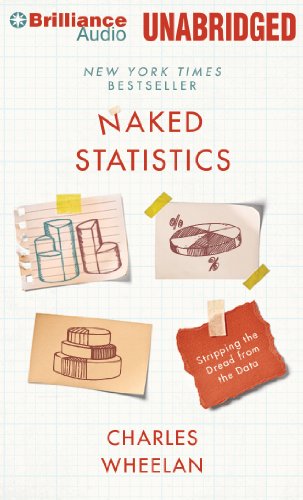
Audie Award Finalist, Business/Educational, 2013
Once considered tedious, the field of statistics is rapidly evolving into a discipline Hal Varian, chief economist at Google, has actually called “sexy.” From batting averages and political polls to game shows and medical research, the real-world application of statistics continues to grow by leaps and bounds. How can we catch schools that cheat on standardized tests? How does Netflix know which movies you’ll like? What is causing the rising incidence of autism? As bestselling author Charles Wheelan shows us in Naked Statistics, the right data and a few well-chosen statistical tools can help us answer these questions and more.
For those who slept through Stats 101, this audiobook is a lifesaver. Wheelan strips away the arcane and technical details and focuses on the underlying intuition that drives statistical analysis. He clarifies key concepts such as inference, correlation, and regression analysis, reveals how biased or careless parties can manipulate or misrepresent data, and shows us how brilliant and creative researchers are exploiting the valuable data from natural experiments to tackle thorny questions.
You’ll encounter clever Schlitz Beer marketers leveraging basic probability, an International Sausage Festival illuminating the tenets of the central limit theorem, and a head-scratching choice from the famous game show Let’s Make a Deal—and you’ll come away with insights each time. With the wit, accessibility, and sheer fun that turned Naked Economics into a bestseller, Wheelan defies the odds yet again by bringing another essential, formerly unglamorous discipline to life.

Interesting and Useful – Statistics are everywhere; the author’s intent is to make them interesting while simplifying the topic. He begins by explaining the mean, how the median is less influenced by outliers, standard deviation (spread), how the weighting of index components affects results, correlation vs. causation, inflation-adjustment, specificity vs. accuracy, the importanace of using the appropriate unit of analysis (eg. people, instead of nations when analyzing the benefits of globalization), statistical vs…
Interesting; should entice those who think they don’t like stats Yes, there are lots of “dear reader” type comments throughout the book. Yes, the examples and references are drawn from up-to-the-minute pop culture. And, yes, if you don’t know very much about statistics and probability you can learn fairly “painlessly” in this book.One drawback: you really, really need to read the entire book from start to finish to really understand all of the concepts. This is not a reference book in which you can “jump around” or just go to the parts you have…